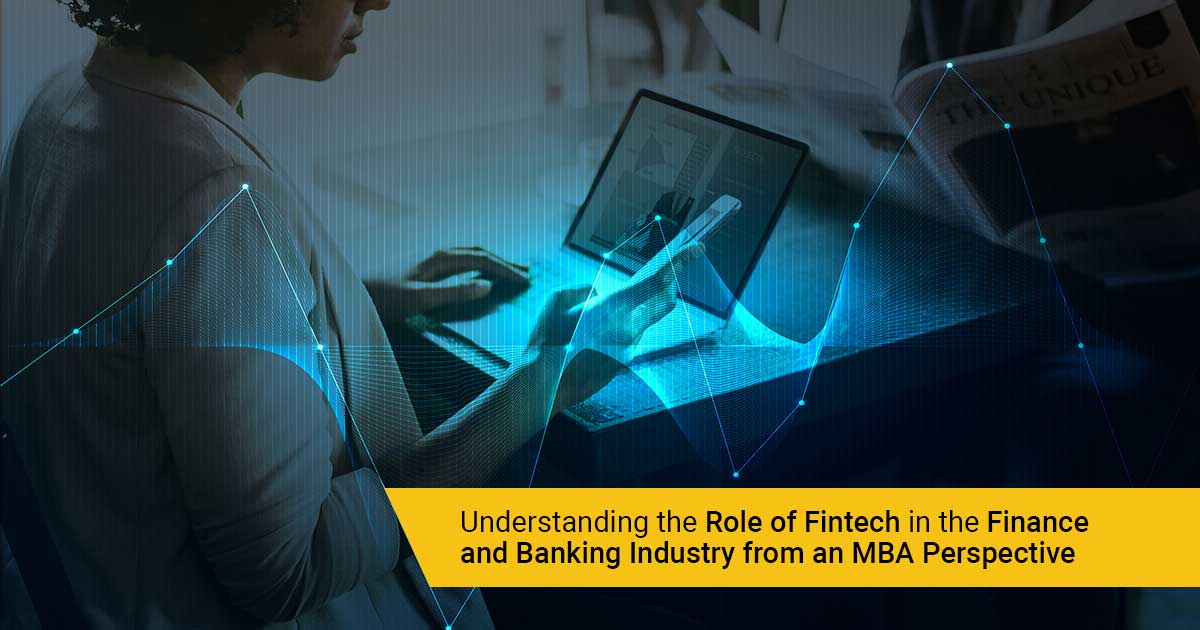Understanding the Role of Fintech in the Finance and Banking Industry from an MBA Perspective
29 Jan 2024

The inception of FinTech dates back to the 1950s, with the emergence of the first credit card by Diners. However, the official integration of technology into financial services took a significant step forward in 1967 when Barclays Bank installed the inaugural ATM, marking the transition from technology to digital technology. Currently, around 2 billion people globally lack access to bank accounts or formal financial services, emphasising the pivotal role of FinTech in facilitating financial services. This statistic underscores the imminent transformation of the finance and banking sectors through the digital revolution.
Essentially, FinTech drives the integration of digital technology into startups, empowering them to create innovative products and services. Acknowledging the rapid evolution of financial technology as a catalyst for innovation and efficiency, business schools aim to equip their students with the skills and knowledge needed to navigate this dynamic landscape. The inclusion of FinTech in MBA programmes reflects the industry's acknowledgement of technology as a driving force behind contemporary financial services. As FinTech continues to redefine traditional banking and finance, MBA students must understand the intricacies of digital payments, blockchain, artificial intelligence, and other technological advancements. Today, we shall understand the role of fintech in the finance and banking industry from an MBA perspective!
Mobile Banking
The ubiquity of smartphones has driven the adoption of mobile banking applications, with the global market expected to reach around $1824.7 million by 2026. These applications, offered by most banks, provide users with a user-friendly interface and a range of services equivalent to traditional banking. With features like fingerprint recognition, mobile banking apps offer quick access to funds and enable users to perform various functions, including bill payments, check deposits, and account balance inquiries. The convenience and accessibility provided by mobile banking contribute to its widespread popularity among consumers. The MBA curriculum often includes modules on digital transformation, where mobile banking serves as a key case study. Students learn how organisations adapt their strategies to embrace digital channels and meet evolving customer expectations.
E-Wallets
E-wallets stand out as a leading financial technology solution, reflecting the surge in FinTech services. As per the WorldPay Report, e-wallets comprised 44.5% of worldwide e-commerce transactions in recent years. Leading e-wallet services such as Samsung Pay, PayPal, and Apple Pay offer a range of functionalities, encompassing peer-to-peer payments, utility bill settlements, top-ups, ticket reservations, international remittances, and more. The significant influence of e-wallets on the banking and finance domains is apparent, serving as the key catalyst for digital payments and necessitating users to connect their bank accounts for seamless fund transfers. MBA in Banking Finance is introducing specialised topics in its curriculum that cover topics like digital payments, blockchain, and e-wallets. Students learn about the operational aspects, market trends, and strategic implications of e-wallets in the financial ecosystem.
Biometric Sensors
Biometric sensors can be hailed as a groundbreaking innovation in the banking industry. It is estimated that by 2025, the number of biometric sensor cards could reach 20.6 million. These sensors, coupled with Iris scanners, offer enhanced security and convenience at ATMs. By eliminating the need for physical cards and PINs, biometric sensors enhance customer ease and security. Technologies such as fingerprint sensors, palm scans, eye recognition, and micro-veins contribute to accurate and secure user identification. This feature not only streamlines ATM transactions but also provides a reassuring solution for customers concerned about the loss of physical cards. Given the sensitive nature of biometric data, MBA programmes often include discussions on the ethical considerations and privacy concerns associated with the use of biometric sensors.
Artificial Intelligence
Artificial intelligence (AI) has become integral to FinTech banking services, with global AI in the banking market estimated to reach $64.03 billion by 2030. AI, particularly when combined with machine learning, plays a crucial role in fraud detection. Banks leverage AI-powered software to generate alerts for potentially fraudulent transactions, followed by human investigation for validation. The increased number of fraudulent attacks has made traditional detection methods costly and time-consuming. AI technology allows banks to use historical data to predict and identify fraud patterns, reducing manual efforts and enhancing decision-making insights. The MBA curriculum includes modules on data analytics, where students learn how AI algorithms leverage historical data to make predictions and detect patterns. This analytical skill set is valuable for students to make informed decisions in the financial industry.
Smart Chip Technology
As of 2023, there were approximately 10.81 billion EMV cards globally, showcasing the prevalence of smart chip technology in payment systems. Also known as EMV (Europay, Mastercard, Visa) technology, these chip-based systems enhance the security of transactions by generating unique codes for each transaction. Smart chip technology not only reduces card fraud but also aids banks in adhering to Payment Card Industry (PCI) security standards, minimising the risk of data breaches and associated costs. Smart chip technology and its role in enhancing transaction security are often integrated into risk management courses within the MBA curriculum. Some MBA programmes offer elective courses in cybersecurity, where students explore the technological aspects of secure payment systems, including smart chip technology.
Way Forward
In conclusion, the evolution of FinTech from the 1950s to its present-day prominence marks a transformative journey in the financial and banking sectors. The integration of technology, evident in components such as e-wallets, smart chip technology, biometric sensors, mobile banking, and AI, has not only revolutionised financial services but also prompted business schools to reshape their MBA programmes. As FinTech continues to redefine traditional banking and finance, the ongoing efforts to incorporate these advancements into MBA curricula reflect a commitment to fostering expertise that will drive and navigate the future of financial services.
Recent Blogs
06 Jan 2025
13 Jan 2025
20 Jan 2025